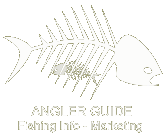By Paul Bruun
Despite advances in drift boat materials, technology and equipment,
there's always something new with which to antagonize river rocks.
And on a recent Sunday I got to row and fish just such a product
around the twistiest portion of the Snake I could find. The results
were surprising.Although
currently based in Steamboat Springs, Colo., Hog Island Boat Works
was conceived from a love of Jackson's own river and the colorful
inhabited area below Munger Mountain to the Hoback by the same name.
 John St. John and his longtime friend David McGuire shared area
whitewater rafting and fishing work stations between Snake River
Park and Mill Iron Ranch for many seasons. Several years ago John
discovered the versatility and resiliency of rotationally molded
polyethylene fabrication. Stimulated by memories of Snake River
drift fishing, his business senses came alive. John St. John and his longtime friend David McGuire shared area
whitewater rafting and fishing work stations between Snake River
Park and Mill Iron Ranch for many seasons. Several years ago John
discovered the versatility and resiliency of rotationally molded
polyethylene fabrication. Stimulated by memories of Snake River
drift fishing, his business senses came alive.
The idea matured dramatically to the
present 16-foot drift boat I bumped, twisted, spun and bounced
between Wilson and South Park. Ironically, that's where Hog Island
finally lost its official island status when WYDOT tired of
road-covering landslides and connected it via a major highway bridge
to the Jackson mainland. I enjoyed blending past with present and
realized that technology can make a big difference.
Ages ago the horrible riding but
extremely sturdy Boston Whaler outboard runabout introduced the
boat-buying public to fiberglass and foam sandwich hull
construction. Boston Whaler touted its 13-foot, tender-sized boat as
unsinkable even when sawed in half! Ad photos of the "half boat"
still afloat sold millions of Whalers despite its hefty weight and
vertebrae-crunching ride.
Plastic drift boat builders, myself
included, have regularly toyed with sandwich hull and gunwale
construction both for durability and strength. Additions of treated
balsa wood as well as layers of various foam thicknesses serve both
as partial or full stringers to stiffen bottoms, sides and transoms.
 Enclosing foam between a top and bottom layer of fiberglass cloth
and resin makes for a strong structure, but the project is time
consuming and costly. Enclosing foam between a top and bottom layer of fiberglass cloth
and resin makes for a strong structure, but the project is time
consuming and costly.
What John St. John discovered is that
rotational (roto) molding is a quicker and stronger process that
begins with an "outer skin" of high-density polyethylene. Inside
this skin is injected polyethylene foam pellets which when heated
and the entire boat rotated, create a thick and rigid foam core that
bonds to the skin. St. John was already investigating rotomolding in
a Monroe, La., location, when he learned that a plant in Stockton,
Calif., designed and built a number of durable boats for a rigorous
new Disney theme park ride.
Even the greatest boat theories don't
translate magically to the water without extensive design and trial
and error. In this respect, St. John and his associate McGuire were lucky.
They obtained the services of a veteran powerboat marine engineer
who designed a 16-foot hull with an extended bottom rocker but
relatively low sides (21 inches) and a sanitary interior. The round
radius chine provides quick maneuverability but will slide more
easily over rocks than a move severe edge.
Despite a shiny strong pair of
nine-foot Cataract Composites with magnum blades, I was a little
skeptical about snapping the estimated 400-pound drifter through a
snag filled, nine-mile fishing gymkhana. John took the bow and Hog
Island Boatworks publicist/visual media specialist Mark Peter
stepped in the stern. Including food and drinks, their gear and the
non-diminutive Bruun, we had a full boat!
A fascinating fact about the Hog
Island LTD 16 is that the pivot axis of the boat lies magically
right beneath the oars.
 While
the operator seat is adjustable to accommodate most rowers, the oar
locks stay put. This translates into easy rowing and instantaneous
maneuverability. While
the operator seat is adjustable to accommodate most rowers, the oar
locks stay put. This translates into easy rowing and instantaneous
maneuverability.
"She only draws five inches at the
oar locks," John shouted back to me as he realized I was trying to
ground his brand new water baby on the first shallow gravel bar. We
skimmed over it nicely, ready for future migration downstream.
I continued to be pleasantly
surprised at how easily I could yank the roto molded boat in and out
of heavy water, slide over shallows and slam on the brakes to
hesitate and investigate tiny pockets.
Within sight of the South Park (Hog
Island) Bridge, I stepped to the bow to make a few casts. Without
even using the through-the-hull-anchored aluminum casting yoke, I
was comfortably balanced standing. I tested John's rowing balance by
standing heavily on one leg and then the other, something that often
upsets the rowing angle on most drift boats. John didn't appear to
notice my shenanigans. I also could fish comfortably forward while
sitting down in the big plush 360-degree rotating chairs. This is a
real plus to boaters who may be hauling older anglers.
For more information contact Hog
Island Boatworks, 1712 13th St., Steamboat Springs, Colo., 80487 (www.hogislandboatworks.com),
(970) 870-1660 or contact Hog Island Boatworks via email at
info@hogislandboatworks.com
|



